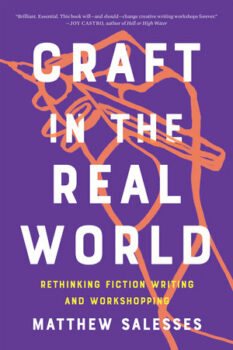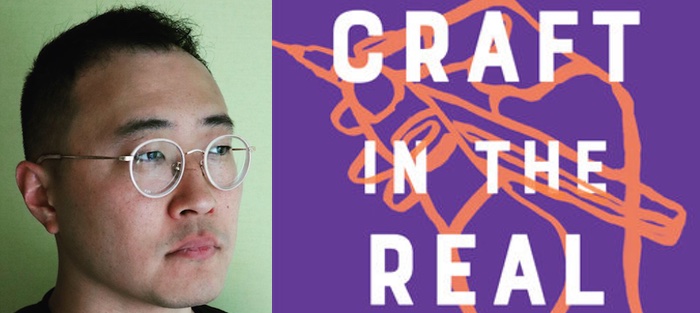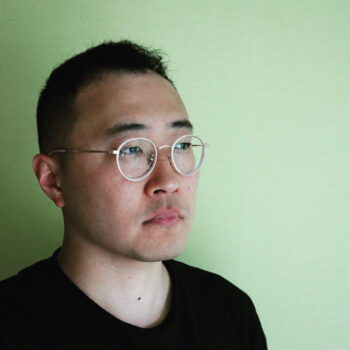For years I have been following Matthew Salesses’s thoughts on craft, on workshop, on revision as they appeared periodically on Pleides and other websites. I was thrilled to learn those thoughts had been gathered, developed and expanded on in his much-anticipated book, Craft in the Real World: Rethinking Fiction Writing and the Workshop (Catapult).
The book manages to be both practical and philosophical, and with any luck will change creative writing pedagogy forever. Gone will be the days of singular rules, the same old examples, and the “workshop story.” Instead conversations can be about traditions, possibilities, and the writer’s intent.
It was my pleasure to talk pedagogy with Matthew via the magic of the internet.
Interview:
Ayşe Papatya Bucak: I understand one of the major points of Craft in the Real World to be that there is no such thing as a universal reader, and as a result, workshops need to understand who the audience is for a piece of writing before they can give appropriate feedback on it. Who is your intended audience for this book and how did that impact the writing of the book? Were there specific moments where you made decisions based on audience?
Matthew Salesses: The audience for the book shifted through edits, which is quite common for me. As you might expect, the publisher wanted a broader audience than the audience I was most concerned with. I had also written many of the chapters as essays for different audiences, and a large part of making everything a book was editing the chapters to have a more unified sense of audience.
I ended up splitting the book into two parts, so that I could focus one part on an audience of progressive writers coming to the book for craft lessons and the second part for an audience of progressive writers coming to the book for teaching guidance.
 How do you teach students to talk about audience? I imagine some students might have a stronger awareness of who they are writing for, and others in imagining who they might write for might say some offensive things. Basically, I like the idea of talking to students about audience but am wary of even well-intended students saying stereotypical things about groups of people. Is that an issue?
How do you teach students to talk about audience? I imagine some students might have a stronger awareness of who they are writing for, and others in imagining who they might write for might say some offensive things. Basically, I like the idea of talking to students about audience but am wary of even well-intended students saying stereotypical things about groups of people. Is that an issue?
This isn’t an issue in my experience. I ask my students to think about three concentric rings of audience (I learned this from Mat Johnson). The most immediate audience, the audience at the center, is their first reader(s). Then there’s an ideal audience of readers who might understand nearly everything the author intends (I tell my students to think of a group of maybe a thousand people). Finally, there’s the audience that could make the book a bestseller, which would include people outside of the ideal audience, who would still enjoy the book. Outside of that, anyone can make the effort of reading into different expectations, which is also important for a book’s life but is not an audience to worry about in the writing.
I once had a student say he writes for a slightly smarter version of himself (in this case a white male among other things). What do you think of the idea of writing for yourself, an audience of one?
Thinking about multiple stages of audience changes that conversation. Some of my students do imagine a representative image of themselves as their ideal audience, especially if their goal is mainly representation. I think it depends on a writer’s purpose. Why is that student writing for a slightly smarter version of himself?
You emphasize the fact that workshops are looking at manuscripts in progress and so should stop treating those manuscripts as if they are final products. As a result, your classes emphasize process. Do you have pedagogical practices or suggestions on how to teach students to understand their process and how to talk about it?
In the book, I describe how my students produce “Writing Notes” alongside their drafts and revisions. In these notes, they describe the reasons for the writing decisions they make. In workshop, we talk about those decisions and the reasoning. We ask the author questions. Every step of the way, we address process—in the lead-up to workshop, in workshop, in meetings after workshop, in discussion of the readings, etc.
One of the things I find amusing about lists of writing rules is that they invariably include “there are no rules” as their last rule. Is that a pedagogical version of saying “just kidding” when everyone knows you weren’t really kidding? What do you think is the underlying message of a pedagogy that says, here are some rules but really there are no rules?
Ha. This is a move. Like any other move writers make, it’s a move we make because we’ve seen something like it done before.
In the book, you write about Michelle Cliff, who said she had to “break from accepted craft in order to tell her story.” It seems like time often rewards those writers who “break from accepted craft.” Aren’t the boundary-pushers the writers who are more likely to stand the test of time? Is there something to be said for giving writers rules (or “accepted craft”) to resist? Or does my premise not ring true?
I don’t believe in standing the test of time. I hope CITRW becomes irrelevant as soon as possible. Then it will have done its job. I think—and this is the point the book makes—that we should write for the world we live in. I don’t understand writers who write for when they are dead. It’s morbid. Plus, what “stands the test of time” is what speaks to power.
Given the host of problems it can create, why use workshop as a way to teach writing at all? Does it have particular value?
I believe it does. I’ve learned a lot from workshop, from talking through a particular work-in-progress with the author in depth. But I also think there are other ways of teaching writing and that workshop can’t be the only way. It’s one tool that we have.
In the book, you talk about about how different audiences evaluate books via different criteria—because our criteria are culturally based. Do you think there is such a thing as bad taste or, put another way, a bad reader? Or is it always a matter of being the wrong audience for that book?
I suspect bad readers are people who rarely read at all.
Do you ever invent craft terms? Or are there writing practices/techniques/tools that you think would benefit from having a name?
I’m sure I have in the past. There are benefits to this, and some are described well in a forthcoming book called The Antiracist Writing Workshop by Felicia Rose Chavez. On the other hand, there are benefits to students knowing terms that will serve them in other workshops. In part, I want to give my students alternative definitions that can help them think about multiple possibilities before a term becomes solidified in another class or book or conversation.
I am a fan of Jenny Odell’s How to Do Nothing, which advocates for the value of time periods in which an artist is not visibly producing. But I am very aware that it is my teaching job that gives me the financial security that allows me to have time that is not “productive.” I worry a great deal about the lack of financial literacy and financial practicality that I see in my writing students, so I have started talking to them about how writers make a living, how to pay off student loans, how to turn their skills learned in workshop into lines on a resume. But it would be nice if I didn’t have to—I’d prefer to just talk about art.
I noticed you ban words like “earn” or “buy” from your workshops (when talking about story). Is there a difference between resisting the language of capitalism in workshop and talking to writers about money?
I took this from my friend Laura van den Berg. If this ban on economic evaluations of craft can help my students think about why the language we use for creating is so steeped in capitalism, then I’m glad. This isn’t to say that I encourage my students to think of art as separate from the capitalist world we live in—quite the opposite, as the book argues. I agree that it’s helpful to talk about financial considerations re: publishing and the life of the artist. I’m just not sure saying an ending “pays off” or not is doing that. I think it’s useful for students to consciously check themselves.
What’s your feeling on guilty pleasures? I sometimes catch myself thinking, well this TV show is problematic in many ways, but it’s my comfort food so I’m going to watch it anyway. I give myself a pass because I think I can watch a problematic show and not be indoctrinated by its problems. But I get frustrated when people take that position in regard to books. I can see my hypocrisy, yet I haven’t stopped consuming problematic culture. Thoughts? Can I get absolution?
I’m no pope. I will say that there are a lot of stories out there, though; there’s no shortage. But I get it. I watch a lot of Kdrama, some of which is definitely problematic. But I do think it affects us. I think we have to watch it not guiltily, but critically. Guilt is often a response to avoid critically engaging with something (see: white guilt), and not critically engaging with our pleasures is the same as training ourselves to take pleasure in non-criticism.
In another interview you mention a book I love, The Conversations: Walter Murch and the Art of Editing Film by Michael Ondaatje, as a book writers could learn from. What is it you like about that book?
It’s an entire book about editing! I also think the gap between mediums can be very productive to the creative imagination. When I see someone doing something I love in another medium, I often wonder, how would you do this in writing, and trying to get my mind around that encourages complexity.
I am half-Turkish and I’ve noticed Turkish culture is fate-saturated. There is a great TV show Leyla and Mecnun, which takes the myth of Leyla and Mecnun—two lovers who are fated to be kept apart—and plays with it over and over in dramatic and comedic ways. Essentially the characters’ fate is a formal structure that the TV show looks to subvert over and over.
This seems somewhat similar to the way you talk about fate in your essay “Fate and Desire in Asian America.” Do you view fate as a formal constraint? Something that demands originality in response?
I like thinking of fate as demanding originality, especially since the two seem to contradict each other. I don’t think of fate as a formal constraint, but as a part of life that is always, intrinsically, a part of fiction, since by the time you start reading a book, the book’s path is already determined.
Do you think originality matters in fiction? How do you talk to students about originality?
I do think it matters, but I don’t actually think it’s something to worry about. It’s already there, for each of us. There’s no teaching originality, only the faith to believe in the originality of the self.
You defend coincidence in story and argue against the notion that a story could be unbelievable. Yet there are times in reading a story that I feel like the writer has manipulated events in such a way that is convenient to the story they wanted to tell. And that feels like cheating. Is that different from a story being “unbelievable”?
I think the feeling that the story is “cheating” is a feeling we learn alongside a set of expectations of what a story should do or be. The feeling comes from the story not following the rules that you expect it to follow. The point is that there are various rules, some which embrace what one might call “manipulating” events and some which embrace hiding that manipulation. There is no writing, though, that isn’t literally a writer’s manipulation of words and events. We need to stop pretending the story just comes on its own and isn’t within the writer’s control. Then we can address why some readers feel that one kind of control is “natural” or (one of my least favorite words for fiction) “organic,” while another kind of control is “cheating” (which is to say, against the rules).
Do you have thoughts on the use of sensitivity readers?
Use them, sure, but they’re no replacement for friends. If you can’t give your manuscript to a friend who can tell you straight, then don’t write it—you’re living as if you can separate yourself from the world you’re writing about. (“You need to change your life.”) Your imagination is not a free pass to a reality you choose not to participate in.
Is there any value to the idea that it is possible to write over-consciously, to write with craft too much in mind?
Sure, in producing new material. The key is revision. I believe in revision the way I believe in self-awareness. It’s the process of making conscious what is unconscious. The process of becoming a better writer is also the process of becoming a better person.







